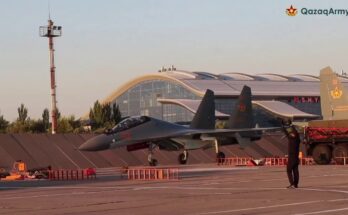Just a few weeks before the U.S. presidential election, the Trump administration has cleared yet another billion-plus-dollar Foreign Military Sales package for Taiwan. The latest FMS package involves three sales proposals covering High Mobility Artillery Rocket Systems (HIMARS), MS-110 Recce pods and AGM-84H Standoff Land Attack Missile – Expanded Response (SLAM-ER) missiles. Altogether, the three sales proposals total an estimated $1.811 billion.
The latest FMS package cleared by the U.S. government (notification of all three potential sales was delivered electronically to Congress from the Pentagon’s Defense Security Cooperation Agency on October 21) signals furthering tensions between Washington and China. The U.S.-China rivalry now covers everything from trade spats and espionage to cyber-hacking and data-mining concerns voiced by Washington, predatory economic practices, disputes over broad Chinese claims in the South China Sea, and, of course, Taiwan.
Taiwan represents a first line of defense for Washington’s interests in the region and attempts to contain China’s military. For China, Taiwan is an illegal, breakaway part of the mainland whose de facto government is not recognized by Beijing, but instead seen as a usurper. China has pressured countries to not recognize the Taiwanese government and persists in stating that it is entitled to reclaim the island by force if necessary.
Because of the diplomatic pushback and outrage voiced by Beijing each time a sale of anything resembling military or dual-use technology to Taiwan is announced, governments across the globe are wary of granting export licenses for defense hardware to Taipei.
This leaves Taiwan largely dependent upon the U.S. to supply its military with foreign-sourced technologies and hardware. Even then, many U.S. administrations have refrained from granting sales of high-end hardware to the Taiwanese government over the past 30 years in order to avoid diplomatic fallout with Beijing. One such example involves efforts by Taiwan to procure F-16C/D combat aircraft from Washington, which were rebuffed by multiple administrations.
However, U.S. laws such as the Taiwan Relations Act (P.L. 96-8, a law passed by Congress in 1979) require Washington to sell defensive systems to Taipei and, if necessary, provide the means to purchase such systems through the FMS program. The latter distinction is a key loophole in that 1979 was also the year in which the U.S. officially recognized the government of the People’s Republic of China (PRC) and not the Republic of China, or Taiwan.
Thus arms sales – generally involving services for already-existent platforms or top-up munitions, etc. – have persisted.
The administration of George W. Bush bypassed Taiwanese requests for the sale of F-16s and waited until October 3, 2008, the final day of the congressional session and three months before its departure from office, to notify Congress of its approval of six of eight pending FMS requests, representing a combined total of around $6.5 billion.
The tactic of submitting formal announcements to Congress of approved FMS agreements in tranches was repeated by the Obama administration on January 29, 2010 (five major programs worth an estimated $6.4 billion) and September 21, 2011 (three major programs totaling an estimated $5.9 billion). The Obama administration green‑lighted an FMS bundle to Taiwan in December 2015 that packaged together had a value of $1.83 billion. That bundle included two Navy frigates, anti-tank missiles, and amphibious attack vehicles (AAVs).
But the Trump administration – which entered office in January 2017 with an eye on China’s economic practices and increasingly aggressive posture globally – has embodied a more brazen approach to Taiwan than its predecessors.
No longer willing to hold back out of concern for diplomatic niceties with a steadily strengthening China, the president-elect took a phone call from Taiwanese President Tsai Ing-wen in December 2016 prior to his inauguration – a seemingly minor step, but one that triggered Chinese outrage and signaled a change in approach to Beijing.
Shortly after entering office, the Trump administration cleared an arms package worth up to $1.3 billion for Taiwan in June 2017. The deal included upgrades for surveillance and electronic warfare systems, advanced missiles for the Taiwanese Air Force’s upgrade of legacy early-standard F-16s, torpedoes for the Taiwanese Navy’s Dutch-built submarines, and SM-2 Block IIIA surface-to-air missiles for the country’s air defense network.
Much more was still to come.
Despite Beijing’s persistent warnings to prior administrations that such a sale would cross a “red line,” the Trump administration approved Taiwan’s formal FMS request for 66 F-16Vs at an estimated cost of $8 billion, with notification sent to Congress on August 20, 2019. Congress readily cleared the deal, with a Letter of Offer and Acceptance (LOA) signed by both countries on December 13, 2019, paving the way for the deal’s implementation.
Another batch of FMS proposals worth $2.22 billion – including 108 Abrams M1A2T main battle tanks, 250 Block I-92F Stinger missiles, M88A2 armored recovery vehicles, and M1070A1 heavy equipment transports, plus machine guns, munitions, smoke grenade launchers, and various other materiel – was also approved, with notification sent to Congress on July 8, 2019.
But it was the F-16V sale that illustrated that China’s warnings no longer carried the same weight in a Washington alarmed by Beijing’s predatory economic practices and influence operations, and its all-of-nation long-term strategy to eclipse American power and global standing.
China’s long game had raised alarm bells in Washington and ultimately elicited the rarest of things in the U.S. capital: a bipartisan consensus.
The latest bundle of arms sales to Taiwan merely continues the trend.
Once approved and contracted for – as is expected – the latest FMS proposals will provide Taiwan with something it has been eager to acquire: the truck-based advanced artillery HIMARS system. The Taipei Economic and Cultural Representative Office (TECRO) in the United States requested procurement of 11 HIMARS M142 rocket launchers, 64 ATACMS M57 unitary missiles, 17 International Field Artillery Tactical Data Systems (IFATDS), 11 M204B 7.62mm machine guns, and seven M1152A1 HMMWVs as part of the sale.
TECRO also requested the sale of 135 AGM-84H SLAM-ERs and six MS-110 Recce pods with three transportable ground stations and one fixed ground station. The MS-110 is an advanced day/night long-range airborne reconnaissance system that can be installed on fast jets, drones and manned intelligence, surveillance and reconnaissance (ISR) aircraft.
What’s more, additional sales are reportedly on the horizon. These include unarmed MQ-9 Reaper ISR high-altitude long-endurance (HALE) unmanned aerial vehicles (UAVs), Harpoon anti-ship missiles, and underwater mines.
If those sales are cleared as reported, then Congress will approve them – and regardless of which candidate wins the upcoming presidential election, a tougher stance toward China will persist.

Dan Darling is Forecast International’s director of military and defense markets. In this role, Dan oversees a team of analysts tasked with covering everything from budgeting to weapons systems to defense electronics and military aerospace. Additionally, for over 17 years Dan has, at various times, authored the International Military Markets reports for Europe, Eurasia, the Middle East and the Asia-Pacific region.
Dan's work has been cited in Defense News, Real Clear Defense, Asian Military Review, Al Jazeera, and Financial Express, among others, and he has also contributed commentary to The Diplomat, The National Interest and World Politics Review. He has been quoted in Arabian Business, the Financial Times, Flight International, The New York Times, Bloomberg and National Defense Magazine.
In addition, Dan has made guest appearances on the online radio show Midrats and on The Media Line, as well as The Red Line Podcast, plus media appearances on France 24 and World Is One News (WION).




